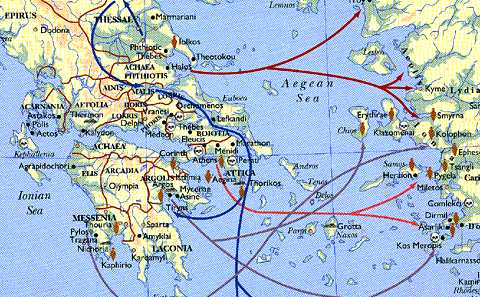
1. Prologue
Placing ancient Greek music at the "origins" of Western written art music - according to a stereotype that has not yet disappeared in historical musicology - influences still today our understanding of this musical culture in different ways. On the one hand, the process of reduction of the many dimensions of music to just music theory and notation led to ignore the manifold sound events belonging to the many-sided and different urban and regional traditions of the Mediterranean area inhabited by the Greeks.These various musical traditions developed and evolved over a period of more than a thousand years, from the 8th century BC onwards.

Map of ancient Greece (around 800 BC)
On the other hand, the same tendency to oversimplify also led to nearly cancel the traces of any musical dimension associated with other intellectual and social domains of the Greek civilization. Consequently, Greek musical culture (or, at least, what is commonly regarded as such) has generally been viewed as set apart from all other forms of human experience - an attitude that has thus reinforced the sense of its uniqueness with regard to all other past and present cultures of the Mediterranean. Only in our century has a new approach begun to appear.
From the 1920s onwards, with the emergence of Gernet and Meyerson's historical psychology, based on Durkheim's sociology and Mauss's ethnology, the lesson of historical anthropology began to influence considerably the methodology adopted in classical studies (Vernant 1989; Di Donato 1992). However, only in the eighties did scholars begin to discover new possibilities of rethinking the music (or better, musics) of the Greeks, thanks to the increasingly interdisciplinary dialogue that developed in the fields of ancient history and musicology.
The development of musical anthropology as an approach concerning historical and systematic musicology, as well as ethnomusicology (Magrini 1993), and its adoption in the study of periods of the past, such as the Middle Ages (Gallo 1986; 1993), led to the acknowledgement that this approach could also be extended to Ancient Greece. Once recognized as pertaining to the vast category of "ethnic" music (West 1992:3), the music of the ancient Greeks can and should be considered - also through the study of Greek music imagery - not only in terms of structured sound, but also as human behavior (Merriam 1964).
The different lines of investigation mentioned above have been employed to inquire into the common ground which is constituted by the domains of music and myth in Ancient Greece, putting an end to the "miracle" of Greek music and to its isolation. This view entails addressing the close relationships between Greek music and myth, as a reality shared by the peoples who lived and still live in the Mediterranean. In particular, it moves from the consideration of myth as "one of the most persistent frameworks for musicians in the Mediterranean to ascribe identity and place" (Bohlman 1997). According to this approach, the visual change imposed on us by the journey's distance, favoring up on return a re-appreciation of the "ricchezze di casa" (Barba 1993:363), can be linked to the temporal-spatial shifts between past and past, or past and present, of the peoples of the Mediterranean.